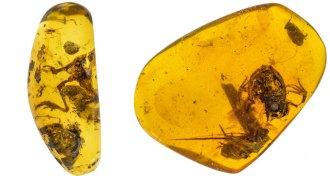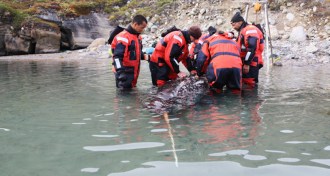All Stories
-
 Astronomy
AstronomySwirling gases reveal baby planets in a young star’s disk
A new technique pinpointed three planets forming around a young star about 330 light-years from Earth.
-
 Paleontology
PaleontologyThese newfound frogs have been trapped in amber for 99 million years
Trapped in amber, 99-million-year-old frog fossils reveal the amphibians lived in a wet, tropical climate.
-
 Planetary Science
Planetary ScienceThe Mars rover Opportunity is sleeping, not dead, NASA says
Opportunity is hunkered down in a deep sleep on Mars to ride out what’s looking to be a long dark dust storm.
-
 Humans
HumansWhat I actually learned about my family after trying 5 DNA ancestry tests
Ancestry results vary widely depending on which company you use.
-
 Genetics
GeneticsDNA testing can bring families together, but gives mixed answers on ethnicity
DNA testing has become a new way for millions of Americans to expand their family trees and learn something about themselves, but results vary widely.
-
 Animals
AnimalsHere’s what narwhals sound like underwater
Scientists eavesdropped while narwhals clicked and buzzed. The work could help pinpoint how the whales may react to more human noise in the Arctic.
-
 Climate
ClimateAntarctica has lost about 3 trillion metric tons of ice since 1992
Antarctica’s rate of ice loss has sped up since 1992 — mostly in the last five years, raising global sea level by almost 8 millimeters on average.
-
 Physics
PhysicsThis heavy element has a football-shaped atomic nucleus
Three nobelium isotopes have oblong nuclei, and some sport a ‘bubble’ center.
-
 Physics
PhysicsIn her short life, mathematician Emmy Noether changed the face of physics
A century after she published a groundbreaking mathematical theory, Emmy Noether gets her due.
-
 Science & Society
Science & SocietySo what do you know about Emmy Noether?
Editor in Chief Nancy Shute discusses physicist Emmy Noether and women being underrepresented in science fields.
By Nancy Shute -
 Environment
EnvironmentSunshine is making Deepwater Horizon oil stick around
Sunlight created oxygen-rich oil by-products that are still hanging around eight years after the Deepwater Horizon spill.
-
 Astronomy
AstronomyReaders were curious about pendulum saws, laser tweezers and more
Readers had questions about Bronze Age pendulum saws, dark matter, lazer tweezers and more.